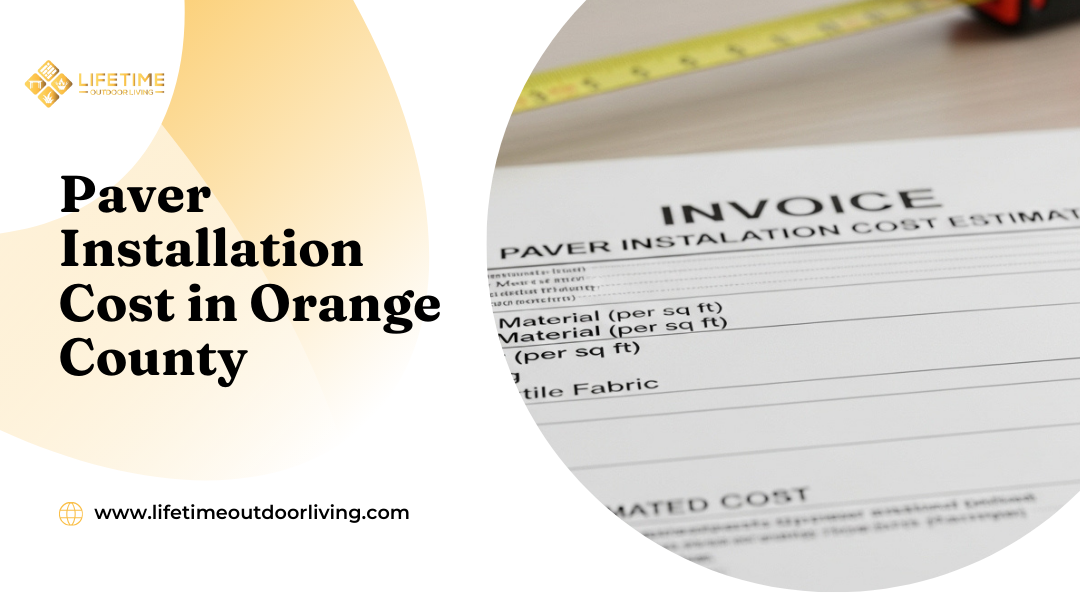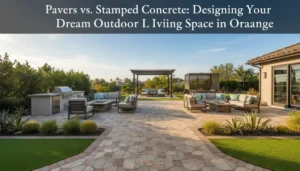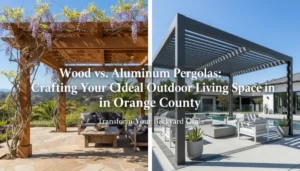Installing pavers in Orange County transforms outdoor spaces while adding significant value to properties. Homeowners throughout the region are increasingly choosing paver installations for driveways, patios, walkways, and pool decks due to their durability and aesthetic appeal.
The cost to install pavers in Orange County typically ranges from $15 to $28 per square foot, depending on material type, design complexity, and site conditions. Concrete pavers generally fall on the lower end of this range at $15-18 per square foot, while brick pavers cost between $16-20 per square foot. Natural stone and premium materials command higher prices within the upper range.
Several key factors influence the final installation cost, including material selection, labor requirements, site preparation needs, and design intricacy. Understanding these cost components helps homeowners budget effectively and make informed decisions about their paving projects. Professional installation ensures proper drainage, base preparation, and long-term durability that protects the investment.
Average Cost of Paver Installation in Orange County
Paver installation costs in Orange County typically range from $15 to $28 per square foot, with variations based on materials, project complexity, and specific application. Labor costs constitute a significant portion of the total expense, while material choices and project type influence the final pricing structure.
Typical Price Range per Square Foot
Sand-based concrete pavers cost between $15 to $18 per square foot in Orange County. This represents the most common installation type for residential projects.
Brick pavers range from $16 to $20 per square foot when installed on a sand base. The price variation depends on brick quality and specific product selection.
Premium installations can reach $21 to $28 per square foot. These higher-end projects typically involve intricate patterns, premium materials, or complex site conditions.
Labor costs specifically range from $1,096 to $1,170 for typical projects. Material and supply costs add approximately $70 to $76 to the total project expense.
Cost Differences Between Driveways, Patios, and Walkways
Patio installations generally fall within the standard $15 to $18 per square foot range. These projects typically require less structural preparation and simpler base requirements.
Driveway installations cost more due to increased structural demands. The base must support vehicle weight, requiring deeper excavation and additional base materials.
Walkway projects often cost slightly less per square foot. However, smaller project sizes may result in higher per-square-foot pricing due to mobilization costs and minimum project fees.
Pattern complexity affects all project types equally. Intricate designs, borders, and custom layouts increase installation time and material waste.
How Orange County Pricing Compares to State and National Averages
Orange County paver costs align closely with California’s premium markets. The $15 to $28 per square foot range reflects the area’s higher labor costs and material transportation expenses.
National averages typically range from $10 to $20 per square foot. Orange County’s pricing sits at the higher end of this spectrum due to regional economic factors.
California statewide pricing generally falls between $12 to $25 per square foot. Orange County’s costs remain competitive within the state’s major metropolitan areas.
Labor rates in Orange County exceed national averages by approximately 15 to 25 percent. This premium reflects local wage standards and construction industry demand.
Key Factors That Influence Paver Installation Costs
Paver installation costs in Orange County vary significantly based on project scale, material selection, design intricacy, site conditions, and local labor requirements. These elements work together to determine the final price homeowners pay for their outdoor spaces.
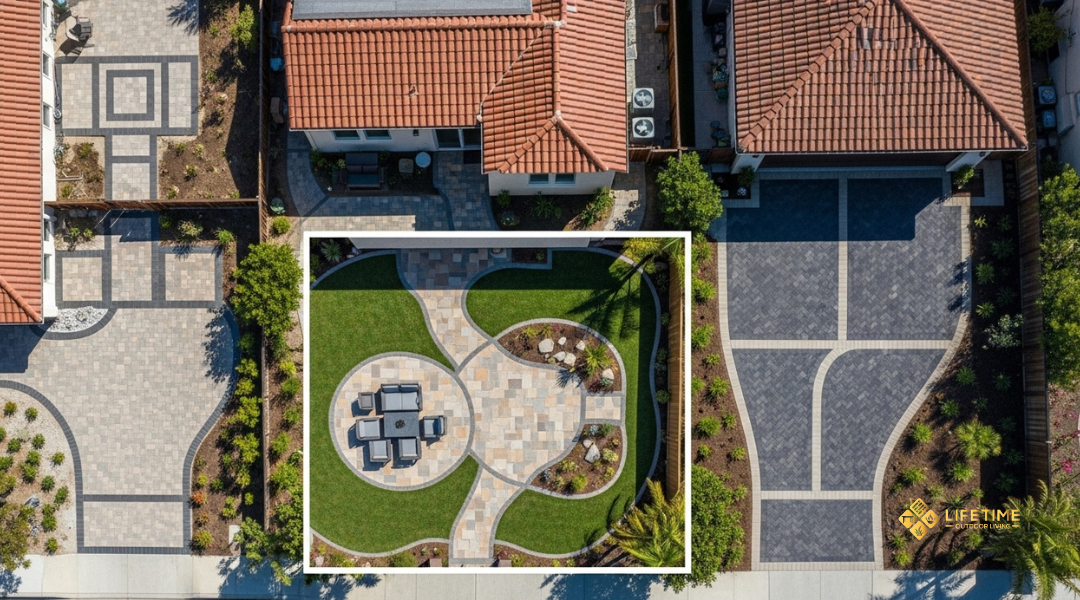
Size and Scope of the Project
The square footage directly impacts both material quantities and labor time required for completion. Larger projects typically achieve better cost efficiency per square foot due to economies of scale.
Standard project sizes and considerations:
- Small patios (100-200 sq ft): Higher per-square-foot costs due to minimum mobilization fees
- Medium spaces (300-600 sq ft): Most cost-effective range for residential projects
- Large installations (800+ sq ft): Maximum efficiency with lowest per-unit pricing
Project scope extends beyond basic square footage. Multi-area installations connecting patios, walkways, and driveways require additional planning and coordination. Each separate area may need distinct excavation and base preparation.
Complex geometries with curved edges or irregular shapes increase material waste and labor time. Rectangular installations use materials most efficiently compared to circular or free-form designs.
Choice of Paver Material (Concrete, Brick, Natural Stone, Interlocking)
Material selection represents the largest variable in project costs. Each type offers different price points, durability characteristics, and installation requirements.
Material cost comparison:
| Material Type | Cost Range (per sq ft) | Installation Difficulty |
|---|---|---|
| Concrete pavers | $2-$8 | Standard |
| Clay brick | $4-$12 | Moderate |
| Natural stone | $8-$30 | Complex |
| Interlocking systems | $3-$15 | Variable |
Concrete pavers provide the most budget-friendly option with consistent sizing and straightforward installation. They offer numerous colors and textures while maintaining affordability.
Natural stone materials like travertine, flagstone, or granite command premium pricing. These materials require skilled installation due to size variations and weight considerations.
Specialty interlocking systems include permeable pavers for drainage management. These products cost more initially but may reduce drainage infrastructure needs.
Design Complexity (Patterns, Borders, Multi-Level Installations)
Pattern complexity significantly affects labor time and material waste percentages. Simple patterns require fewer cuts and allow faster installation progress.
Pattern complexity levels:
- Basic running bond: Minimal cuts, fastest installation
- Herringbone patterns: Moderate complexity, increased stability
- Circular medallions: High skill requirement, extensive cutting
- Mixed material designs: Maximum complexity, premium pricing
Border treatments add visual appeal but increase material costs and installation time. Contrasting border colors or materials require precise measurements and additional cutting.
Multi-level installations involve stepped terraces or raised platforms. These designs need additional excavation, retaining structures, and drainage considerations. Each elevation change requires separate base preparation and grading work.
Decorative inlays or logos demand specialized cutting equipment and skilled craftsmanship. These custom elements can double standard installation timeframes.
Site Preparation (Excavation, Grading, Drainage Needs)
Proper site preparation ensures long-term performance and represents a significant cost component. Orange County’s clay soils and seasonal rainfall create specific preparation requirements.
Excavation depth depends on soil conditions and intended use. Standard residential patios require 8-10 inches of excavation for base materials. Heavy-use areas need deeper preparation with additional base layers.
Drainage considerations:
Poor drainage leads to settling and surface damage. Orange County’s winter rains require proper slope management and potentially underground drainage systems.
Existing hardscape removal adds costs when replacing concrete or asphalt surfaces. Disposal fees and additional labor time increase project expenses.
Soil stabilization may be necessary for expansive clay conditions common in the region. Chemical stabilizers or additional base materials address problematic soil types.
Access limitations affect equipment usage and material delivery costs. Narrow side yards or elevated locations require hand excavation and manual material transport.
Labor and Local Permits
Orange County labor rates reflect the region’s higher cost of living and skilled craftsman availability. Installation crews charge $50-$100 per hour depending on project complexity and company reputation.
Local permit requirements vary by city jurisdiction within Orange County. Most residential paver projects under 250 square feet avoid permit requirements. Larger installations or those affecting drainage patterns typically need permits.
Orange County permit considerations:
Building departments require engineered drainage plans for projects exceeding specific thresholds. These plans add professional fees but ensure proper water management.
HOA approvals may be necessary in planned communities. Design review processes can delay project starts and limit material or color choices.
Utility locating services are mandatory before excavation begins. California law requires 811 calls at least two business days before digging commences.
Licensed contractors carry proper insurance and provide warranty coverage. Their higher rates include business overhead and professional liability protection.
Cost Breakdown by Paver Material
Paver material selection significantly impacts installation costs in Orange County, with prices ranging from $8 to $35 per square foot installed. Material costs vary from $1.25 for basic concrete to $15+ for premium natural stone options.
Concrete Pavers (Affordable and Versatile)
Concrete pavers represent the most budget-friendly option for Orange County installations. Material costs range from $1.25 to $6 per square foot, with total installed costs between $8 and $15 per square foot.
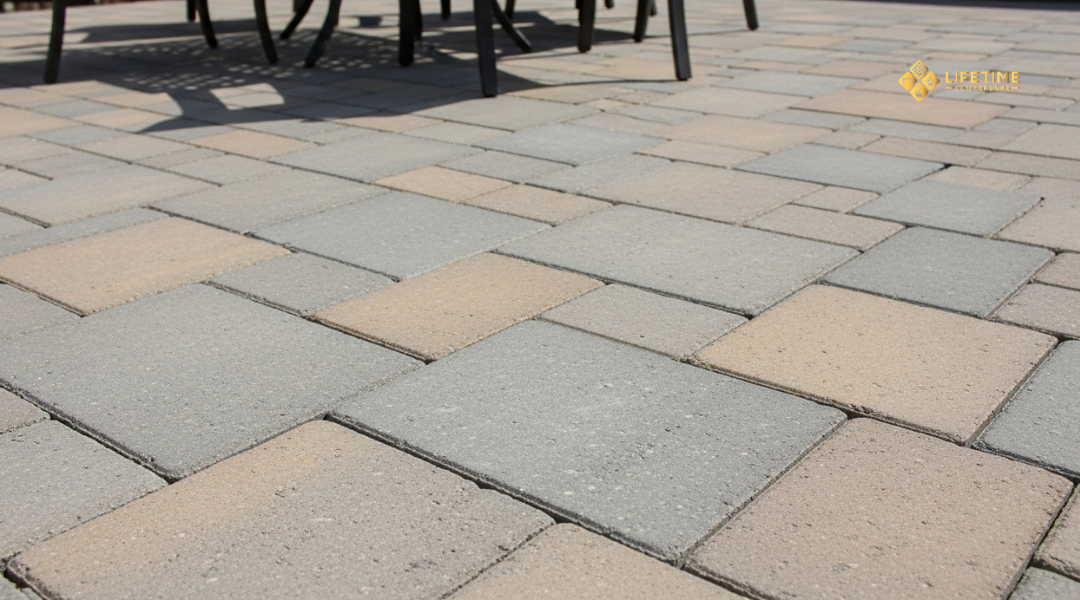
These pavers offer excellent versatility in design and color options. Manufacturers produce concrete pavers in various shapes, sizes, and textures to mimic natural materials.
Key Benefits:
- Lower material and installation costs
- Wide selection of colors and patterns
- Consistent sizing for easier installation
- Good durability for residential applications
Concrete pavers work well for patios, walkways, and pool decks. They handle Orange County’s climate effectively and require minimal maintenance over time.
Brick Pavers (Classic and Mid-Range)
Brick pavers cost between $2 and $6 per square foot for materials, with installed prices ranging from $10 to $17 per square foot. Clay brick pavers provide traditional appeal and proven longevity.
The manufacturing process creates dense, durable pavers that resist fading and weathering. Orange County’s Mediterranean climate suits brick pavers particularly well.
Installation Considerations:
- Requires skilled installation for proper alignment
- May need periodic sand joint maintenance
- Color variations add natural character
- Higher material costs than concrete options
Brick pavers complement traditional and contemporary architectural styles. They maintain their appearance for decades with proper installation and occasional maintenance.
Natural Stone Pavers (Premium Option)
Natural stone pavers command the highest prices, with materials costing $8 to $20 per square foot and installed costs reaching $25 to $35 per square foot. Premium stones can exceed these ranges significantly.
Popular Stone Options:
- Travertine: $12-$18 installed per square foot
- Flagstone: $15-$25 installed per square foot
- Granite: $20-$35 installed per square foot
- Limestone: $14-$22 installed per square foot
Each stone type offers unique characteristics in color, texture, and durability. Natural variations create distinctive patterns that cannot be replicated with manufactured materials.
Installation complexity increases with natural stone due to irregular sizing and thickness variations. Professional installation becomes essential for achieving proper drainage and stability.
Permeable Pavers (Eco-Friendly Solutions)
Permeable pavers cost $10 to $20 per square foot for materials, with installed prices between $15 and $25 per square foot. These specialized pavers address stormwater management requirements increasingly important in Orange County.
The paver design allows water infiltration through joints or porous material. This reduces runoff and helps comply with local water management regulations.
System Components:
- Permeable paver units
- Specialized aggregate base
- Geotextile fabric layers
- Proper slope and drainage design
Installation requires specific expertise in drainage systems and base preparation. The specialized base materials and installation techniques increase overall project costs compared to standard pavers.
Permeable systems provide long-term environmental benefits and may qualify for rebates or incentives from local water management agencies.
Additional Expenses Homeowners Should Consider
Paver installation projects often include costs beyond the basic material and labor estimates. These additional expenses can range from $2-8 per square foot and may include sealing, structural elements, site preparation, and landscape integration features.
Sealing and Long-Term Maintenance
Paver sealing typically costs $2-4 per square foot in Orange County. This protective treatment prevents staining, reduces weed growth, and enhances color retention.
Most contractors recommend sealing pavers within 6-12 months after installation. The process requires thorough cleaning and professional-grade sealant application.
Annual maintenance costs include:
- Joint sand replacement: $0.50-1.50 per square foot
- Pressure washing: $150-300 per project
- Re-sealing every 3-5 years: $2-4 per square foot
Unsealed pavers may develop stains, moss growth, and shifting over time. Regular maintenance extends the lifespan and maintains the appearance of the paved surface.
Edging, Steps, and Retaining Walls
Paver edging installation adds $8-15 per linear foot to project costs. This includes plastic, aluminum, or concrete restraints that prevent paver movement and maintain clean borders.
Steps typically cost $40-80 per linear foot depending on height and complexity. Multi-level installations require additional excavation and structural support.
Retaining wall costs vary by material:
- Concrete block: $15-25 per square foot
- Natural stone: $25-40 per square foot
- Engineered systems: $20-35 per square foot
These structural elements often require permits and engineering approval in Orange County. The additional grading and foundation work can increase project timelines by 2-3 days.
Demolition or Removal of Existing Surfaces
Concrete removal costs $2-4 per square foot in Orange County. This includes breaking, hauling, and disposal fees at local facilities.
Asphalt removal typically runs $1-3 per square foot. The process involves cutting, lifting, and proper disposal according to county regulations.
Additional site preparation may include:
- Soil excavation: $1-2 per square foot
- Debris hauling: $300-500 per dumpster
- Grading corrections: $2-5 per square foot
Unexpected underground utilities or poor soil conditions can increase demolition costs. Most contractors include basic removal in their estimates but charge extra for difficult access or thick existing surfaces.
Landscaping Integration (Turf, Lighting, Water Features)
Artificial turf installation around pavers costs $8-15 per square foot. This includes base preparation, turf material, and professional installation with proper drainage.
Low-voltage LED lighting systems add $150-400 per fixture. Path lights, uplights, and accent lighting enhance safety and aesthetic appeal during evening hours.
Water feature integration costs:
- Simple fountains: $800-2,500
- Fire pits with gas lines: $1,200-3,000
- Drainage systems: $3-8 per square foot
Electrical work requires licensed contractors and permits through Orange County. Gas line installation for fire features typically costs $500-1,200 depending on distance from existing connections.
These integrated features often require coordination between multiple trades and can extend project completion by 1-2 weeks.
How to Save Money on Paver Installation
Smart material choices and strategic planning can reduce paver installation costs by 20-40% without sacrificing quality. Timing purchases during off-peak seasons and selecting efficient layouts maximize value.
Choosing the Right Material for Budget and Lifestyle
Concrete pavers offer the best value at $3-8 per square foot compared to natural stone options that cost $15-25 per square foot. They provide durability and come in numerous styles that mimic expensive materials.
Standard rectangular pavers cost less than specialty shapes or patterns. Simple designs like running bond or herringbone patterns reduce labor time and material waste.
Permeable pavers may qualify for municipal rebates in Orange County due to water conservation benefits. These rebates can offset 10-15% of total project costs.
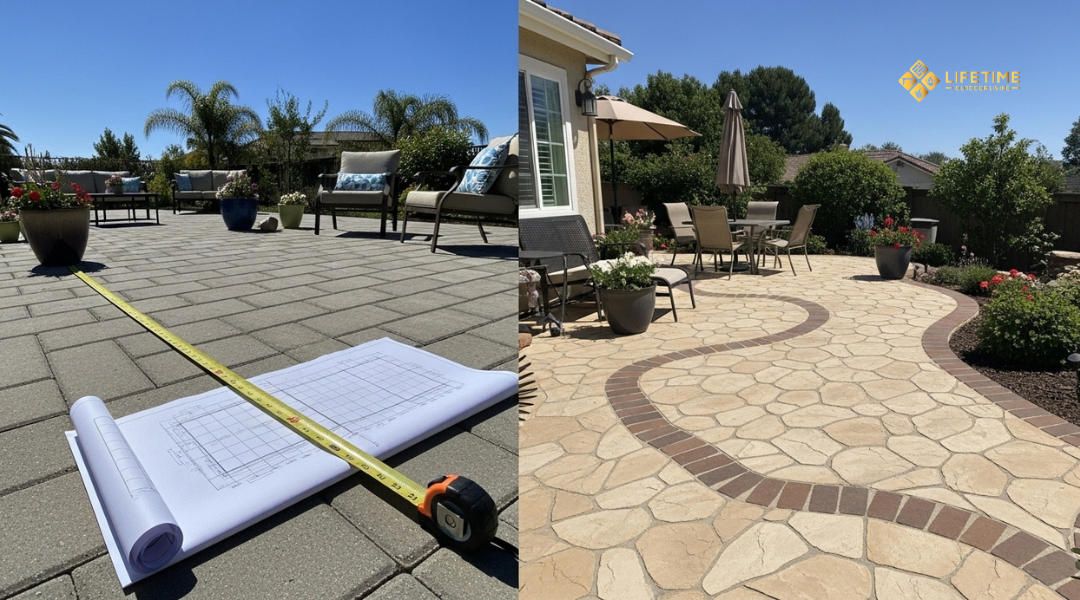
Homeowners should consider long-term maintenance costs when selecting materials. Concrete pavers require minimal upkeep compared to natural stone, which may need regular sealing and replacement.
Planning Efficient Layouts to Reduce Waste
Measuring accurately prevents over-ordering materials. Professional contractors typically add 5-10% for waste, but DIY projects often require 15% extra due to cutting errors.
Rectangular patios and walkways minimize cutting and waste compared to curved or irregular shapes. Each cut paver represents wasted material and additional labor costs.
Modular sizing works with standard paver dimensions. Planning spaces in 4-foot or 6-foot increments reduces the need for custom cuts and special orders.
Homeowners should create detailed layout plans before purchasing materials. This prevents costly change orders and material shortages during installation.
Taking Advantage of Seasonal Discounts and Financing Options
Winter installations in Orange County offer 15-25% savings on labor costs. Contractors have more availability during slower months from December through February.
Material suppliers often clear inventory in late fall and early spring. These seasonal sales can reduce paver costs by 10-20% compared to peak summer pricing.
Financing options through contractors or home improvement stores offer 0% interest for 12-24 months. This allows homeowners to complete projects without depleting savings accounts.
Bulk purchasing with neighbors can qualify for contractor discounts on materials and shared equipment rental costs. Group projects reduce per-square-foot installation expenses significantly.
Why Hire a Professional Paving Contractor in Orange County
Professional installation ensures proper drainage systems, enhanced curb appeal, and long-term durability that DIY projects often lack. Orange County contractors understand local climate conditions and soil requirements that affect paver performance.
Risks of DIY vs. Benefits of Expert Installation
DIY paver installation presents significant risks that can cost thousands in repairs. Improper base preparation leads to uneven settling and cracking within the first year.
Common DIY Problems:
- Inadequate drainage causing water pooling
- Incorrect sand leveling creating uneven surfaces
- Poor edge restraint installation allowing paver shifting
- Wrong base material depth for Orange County soil conditions
Professional contractors understand Orange County’s clay soil composition and drainage requirements. They install proper base layers with correct compaction levels.
Licensed contractors carry insurance protecting homeowners from liability. They also pull necessary permits and ensure code compliance.
Expert installation includes specialized tools like plate compactors and laser levels. These create uniform surfaces impossible to achieve with basic DIY equipment.
Lifetime Outdoor Living’s Workmanship Warranty and Financing Plans
Established Orange County paving contractors offer comprehensive warranties on both materials and installation. These warranties typically cover 3-5 years for workmanship defects.
Professional contractors provide financing options making quality installations accessible. Many offer 0% interest plans for qualified buyers.
Warranty Coverage Includes:
- Settling or uneven surfaces
- Drainage issues
- Joint sand displacement
- Edge restraint failure
Contractors handle warranty claims directly without homeowner hassle. They return to fix issues at no additional cost during the warranty period.
Financing plans allow homeowners to invest in quality materials and installation immediately. Monthly payments often cost less than the long-term repairs needed from poor DIY work.
Ensuring Durability and Long-Term Value
Professional installation adds significant value to Orange County properties. Quality paver patios provide 15-20% return on investment when selling homes.
Proper installation techniques extend paver lifespan to 25-30 years. This includes correct base depth, appropriate slope for drainage, and quality joint sand application.
Orange County’s Mediterranean climate requires specific installation methods. Professionals account for seasonal temperature changes and occasional heavy rainfall.
Professional Installation Benefits:
- Proper drainage preventing water damage
- Correct base compaction preventing settling
- Quality materials suitable for local conditions
- Compliance with Orange County building codes
Expert contractors source commercial-grade materials unavailable to DIY installers. These include polymer-modified setting beds and professional-grade sealers.

